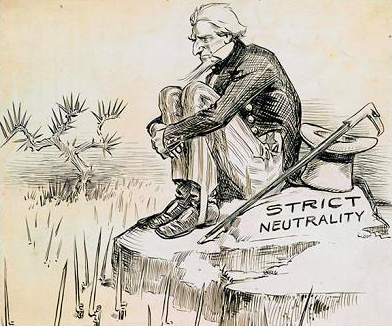
In the 19th and early 20th centuries, political cartoons were the rage. This particular cartoon perfectly illustrates the opinions of the vast majority of Americans until March 1917. North Texas newspapers basically ignored the war in Europe until that time. (From a presentation Mrs. Taylor does regarding Texas during World War I.)
Before my dad died in late June 2012, he gave me several boxes full of papers, photographs, letters, etc. I was so busy caring for him I neglected to look through them until after his death. They were full of his life and his parents’ lives. I spent the remainder of the year learning about those people I thought I knew.
I found myself very interested in World War I. My grandfather who seemed so wise and quiet to me served in the Corp of Engineers for one year, one month, and one day. Why, I questioned? Why did the United States feel compelled to intervene with a war caused by two cousins and their uncle; Czar Nicholas of Russia, Kaiser Wilhelm of Germany, and King George of Great Britain, respectively.
The first book I read was Guns of August by Barbara Tuchman. I highly recommend it. The book explained the complexity of the war and its leaders. But I still wondered about America. I always heard that President Woodrow Wilson ran for second term on the slogan “He kept us out of the War.” And yet in 1917 and 1918 thousands of young men volunteered, were sent to the Western Front, battled not only the German Army but the Influenza Epidemic, and so many lost their lives.
I also became interested in what Americans thought about the Great War, as it was first called. As a historian, I have always believed that newspapers can give the researcher a good idea of local opinions and biases. Often what is published is not exactly true, or in this instance it was what people in Northeast Texas thought.
I decided to focus on the entire region of Northeast Texas as opposed to what Greenville readers saw. And I decided that I would share this information with whoever wanted to know. I created a Facebook page called A Century Ago . . . that I have posted everyday since January 1, 1914. It contains no personal information and absolutely nothing about my own family. It’s strictly what I read in newspapers from Greenville, Dallas, Fort Worth, Paris, Bonham, and others throughout the region.
For 1914 through 1916, most news was very local with a few editorial comments about the war in Europe. The bottom fell out of the cotton market but horses, mules, wheat, canned milk, and beef became top sellers. Farmers were encouraged to diversify their crops. Life continued with little change until March of 1917.
Great Britain intercepted a telegram from Arthur Zimmerman, German Foreign Minister, to the German Ambassador in Mexico, offering Texas, New Mexico, Arizona, and California to Mexico if she would instigate war with the US. Once the telegram became public, attitudes and opinions changed drastically. Here in Northeast Texas war was considered inevitable. But other regions of the country strongly opposed the war. It was never a popular war.
Originally I intended to close the Facebook page right after the Armistice on the eleventh hour of the eleventh day of the eleventh month, or 11:00 AM November 11, 1918. After reading Paris 1919 by Margaret MacMillan, I have decided to carry on through the Paris Peace Conference. Much of the unrest throughout the world today can be attributed to the terms of the Treaty of Versailles. Let’s see what our forefathers thought about it all here in Northeast Texas.
